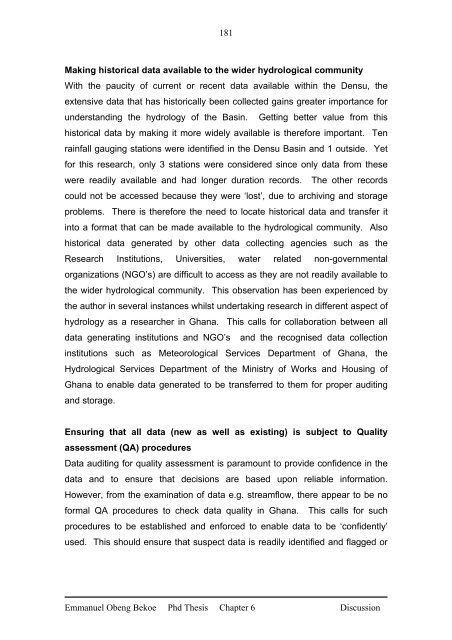PhD Thesis Emmanuel Obeng Bekoe - Cranfield University
PhD Thesis Emmanuel Obeng Bekoe - Cranfield University
PhD Thesis Emmanuel Obeng Bekoe - Cranfield University
You also want an ePaper? Increase the reach of your titles
YUMPU automatically turns print PDFs into web optimized ePapers that Google loves.
181<br />
Making historical data available to the wider hydrological community<br />
With the paucity of current or recent data available within the Densu, the<br />
extensive data that has historically been collected gains greater importance for<br />
understanding the hydrology of the Basin. Getting better value from this<br />
historical data by making it more widely available is therefore important. Ten<br />
rainfall gauging stations were identified in the Densu Basin and 1 outside. Yet<br />
for this research, only 3 stations were considered since only data from these<br />
were readily available and had longer duration records. The other records<br />
could not be accessed because they were ‘lost’, due to archiving and storage<br />
problems. There is therefore the need to locate historical data and transfer it<br />
into a format that can be made available to the hydrological community. Also<br />
historical data generated by other data collecting agencies such as the<br />
Research Institutions, Universities, water related non-governmental<br />
organizations (NGO’s) are difficult to access as they are not readily available to<br />
the wider hydrological community. This observation has been experienced by<br />
the author in several instances whilst undertaking research in different aspect of<br />
hydrology as a researcher in Ghana. This calls for collaboration between all<br />
data generating institutions and NGO’s and the recognised data collection<br />
institutions such as Meteorological Services Department of Ghana, the<br />
Hydrological Services Department of the Ministry of Works and Housing of<br />
Ghana to enable data generated to be transferred to them for proper auditing<br />
and storage.<br />
Ensuring that all data (new as well as existing) is subject to Quality<br />
assessment (QA) procedures<br />
Data auditing for quality assessment is paramount to provide confidence in the<br />
data and to ensure that decisions are based upon reliable information.<br />
However, from the examination of data e.g. streamflow, there appear to be no<br />
formal QA procedures to check data quality in Ghana. This calls for such<br />
procedures to be established and enforced to enable data to be ‘confidently’<br />
used. This should ensure that suspect data is readily identified and flagged or<br />
<strong>Emmanuel</strong> <strong>Obeng</strong> <strong>Bekoe</strong> Phd <strong>Thesis</strong> Chapter 6 Discussion

















